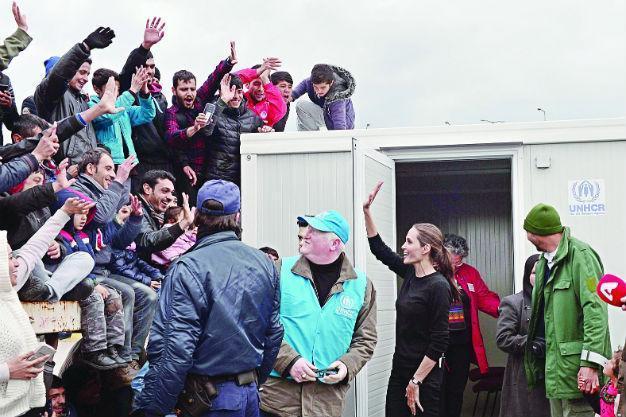Tough bargain awaits Turkey at EU summit
ANKARA

AFP photo
A tough bargain awaits Turkey at a European Union summit on March 17-18 over the Turkey-EU draft deal, which aims to curb the migrant influx into the European Union in exchange for visa liberalization for Turkish citizens and a boost in Turkey’s accession talks to the bloc.The EU-Turkey deal is not offering Turkey “a free ride,” European Commission First Vice President Frans Timmermans said March 16.
Timmermans told a news conference that Turkey would, for example, need to carry out required measures by the end of April to allow Turkish citizens visa-free travel into the EU by the end of June, as Ankara has requested.
“We are certainly not giving Turkey a free ride,” he said.
He also said Turkish requests to open new “chapters” of its long-stalled negotiation on accession to the EU would be considered and said that would need the agreement of EU member states.
German Chancellor Angela Merkel said March 16 that the planned deal offers the first “real chance” to end the migrant crisis that has occasioned the EU’s biggest refugee crisis since World War II but cautioned that the bloc would not seek an agreement at any cost.
Speaking on the eve of the crucial summit in Brussels, Merkel made clear the EU would stand firm on civil rights in Turkey and that Ankara’s bid to eventually join the 28-nation club was “not on the agenda now.”
Hours after holding a meeting with Greek Cypriot President Nicos Anastasiades on March 15, EU Council President Donald Tusk said there was still “hard work” to do to adjust the new refugee deal with Turkey so that it becomes “acceptable” to all members of the 28-member EU.
“My task for our summit on Thursday and Friday [March 17-18] is to put together the elements needed to make this proposal legally sound, in line with EU and international law, practically implementable, and of course acceptable to all 28 EU member states as well as to Turkey. That is why I am here in Ankara today,” Tusk said March 15 at a joint press conference following talks with Turkish Prime Minister Ahmet Davutoğlu in Ankara.
For his part, Davutoğlu said the aim of the 6 billion-euro agreement with the EU on refugees was to reduce illegal migration and make passage to Europe safe.
In a summit with the European Union on March 7, Turkey asked for an extra 3 billion euros in aid in return for its cooperation in stemming the tide of refugees making their way to Europe.
That was on top of the 3 billion euros that the EU agreed to give Ankara in November last year to aid refugees on Turkish territory.
Turkey did not bargain over money and does not see the issue as a financial one but rather a humanitarian one, Davutoğlu said.
Tusk has stressed in a note to EU leaders that a planned deal with Turkey to stem the flow of migrants to Greek islands will be a “temporary and extraordinary measure,” according to Reuters.
Under the plan hailed as a “game-changer,” Turkey would seek to stop refugees’ dangerous sea journeys and take back illegal migrants from Greece. For each Syrian Turkey accepts, it would send one to the EU in a more orderly redistribution program.
But the proposed deal – which would offer Turkey eased access to the visa-free Schengen zone and an acceleration of EU accession talks – has drawn heavy fire on several fronts.
French Prime Minister Manuel Valls said March 15 that he would tell Turkey at the Brussels summit that it wants more effective cooperation with Ankara on the migrant crisis, but will warn against any attempt at “blackmail.”
It is “essential” to work with Turkey, “but there must not be the slightest blackmail,” Valls told the French parliament.
On the same day, the Czech Republic alleged that Turkey was “blackmailing” the EU with demands for extra cash to curb the flow of refugees and migrants to member state Greece.
“The EU’s original proposal to Turkey was for 3 billion euros, now Turkey is asking 6 billion euros and there is talk... of about up to 20 billion euros,” Czech President Milos Zeman said following talks with his Polish counterpart Andrzej Duda in Prague.
“Impolite people like myself call that blackmail,” the 71-year-old veteran left-winger told reporters.
U.N. High Commissioner for Human Rights, Zeid Ra’ad al-Hussein, told Reuters on March 15, that the EU risked compromising its human rights values if it failed to ensure Turkey offers proper protection to all refugees. He added that the U.N. needed to feel assured that Turkey gives full protection to those who merit it.
“We would rather see that full protections are provided,” he said. “There are many concerns we have about the human rights situation in [Turkey], we need to feel assured that the full protection is given to those who merit it.”
















